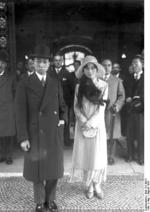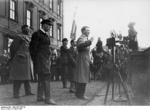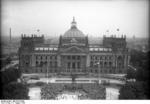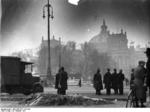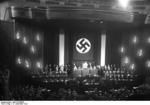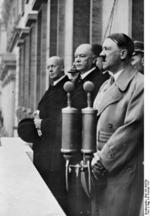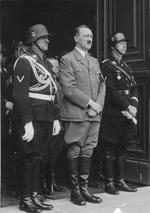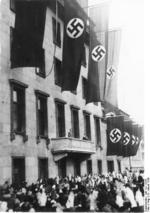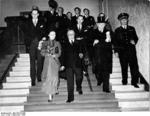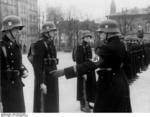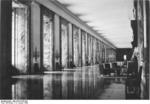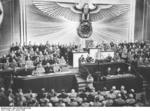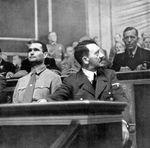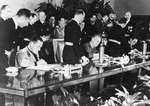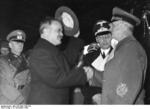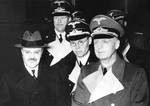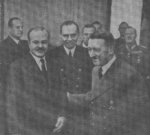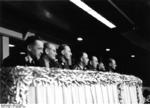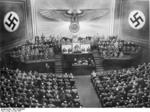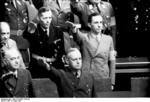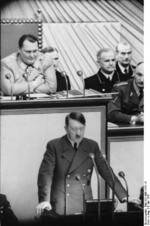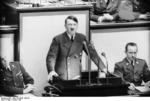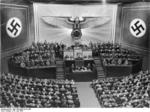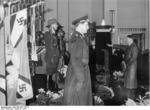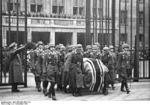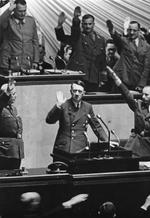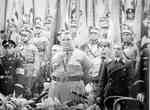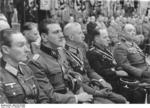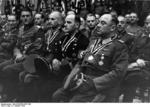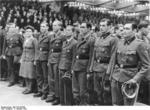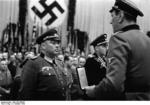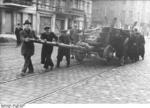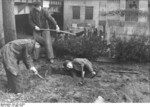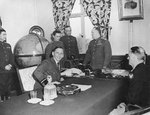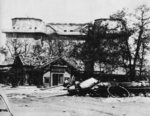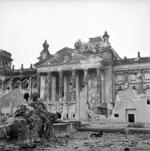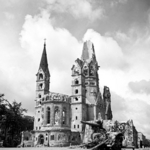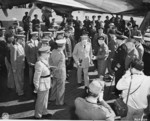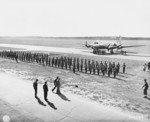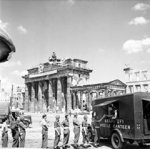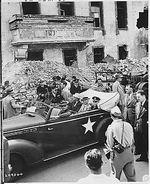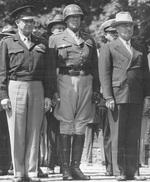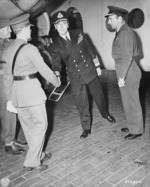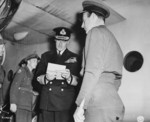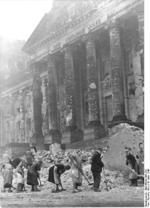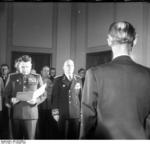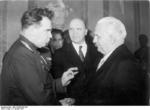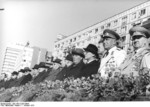15 Feb 1844
Germany
Germany
- The Kroll Opera House in Berlin, Germany began operations as an entertainment venue. ww2dbase [Reichstag Building and Kroll Opera House | Berlin | CPC]
4 Oct 1881
Germany
Germany
- Walther von Brauchitsch was born in Berlin, Germany. ww2dbase [Walther von Brauchitsch | Berlin | CPC]
9 Jun 1884
Germany
Germany
- The construction of the Reichstag building began in Berlin, Germany. ww2dbase [Reichstag Building and Kroll Opera House | Berlin | CPC]
29 Jun 1884
Germany
Germany
- Kaiser Wilhelm I laid down the foundation stone to the Reichstag building in Berlin, Germany. ww2dbase [Reichstag Building and Kroll Opera House | Berlin | CPC]
28 May 1885
Germany
Germany
- Hellmuth Felmy was born in Berlin, Germany. ww2dbase [Hellmuth Felmy | Berlin | CPC]
21 Mar 1893
Germany
Germany
- Walter Schreiber was born in Berlin, Germany. ww2dbase [Walter Schreiber | Berlin | CPC]
11 Mar 1907
Germany
Germany
- Heinz Brandt was born in Charlottenburg, Berlin, Germany. ww2dbase [Heinz Brandt | Berlin | CPC]
2 Dec 1912
Germany
Germany
- German chancellor Theobold von Bethmann Hollweg announced in the Reichstag that, if Austria-Hungary was attacked by a third power while pursuing its interests, Germany would support Austria-Hungary and fight to maintain its own position in Europe. ww2dbase [Reichstag Building and Kroll Opera House | Berlin | AC]
9 Nov 1918
Germany
Germany
- Communist revolutionary Karl Liebknecht, a forty-seven-year-old lawyer and one time member of the German Reichstag, and Rosa Luxemburg, an intellectual theorist raised the Red Flag over the Imperial Palace in Berlin, Germany and proclaimed the establishment of the Spartakusbund (Spartakus Gruppe) to oppose Ebert's new Socialist government. ww2dbase [Berlin | AC]
9 Jan 1919
Germany
Germany
13 Dec 1919
Germany
Germany
- Hans-Joachim Marseille was born at Berliner Straße 164, Berlin, Germany at 2345 hours. ww2dbase [Hans-Joachim Marseille | Berlin | CPC]
18 Mar 1920
Germany
Germany
- Adolf Hitler departed Berlin, Germany after a planned coup failed to start. ww2dbase [Adolf Hitler | Berlin | CPC]
5 Nov 1922
Germany
Germany
- The Treaty of Rapallo was formally signed between Germany and the Soviet Union in Berlin, Germany. ww2dbase [Treaty of Rapallo | Berlin | CPC]
1 Nov 1926
Germany
Germany
- Joseph Goebbels was appointed the Nazi Party Gauleiter of Berlin, Germany. ww2dbase [Joseph Goebbels | Berlin | AC]
3 Oct 1929
Germany
Germany
- German Foreign Minister Gustav Stresemann passed away from a stroke in Berlin, Germany. The strongest figure in the Weimar government, Stresemann had negotiated the reduction in reparations and the treaty of Locarno, as well as getting Germany a seat in the League of Nations. In 1926 he was awarded the Nobel Peace Prize. As Foreign Minister he believed that Germany was destined eventually to dominate Europe, but meanwhile should remain conciliatory with the British, French and Americans. His death left the Weimar government considerably weakened. ww2dbase [Berlin | AC]
31 Jan 1931
Germany
Germany
- Hellmuth Felmy's son, future actor Hansjörg Felmy, was born in Berlin, Germany. ww2dbase [Hellmuth Felmy | Berlin | CPC]
1 Apr 1931
Germany
Germany
18 May 1932
Germany
Germany
- Joseph Goebbels arrived in Berlin, Germany. ww2dbase [Joseph Goebbels | Berlin | CPC]
24 May 1932
Germany
Germany
27 Jul 1932
Germany
Germany
- Adolf Hitler spoke to three separate large crowds in the Berlin-Potsdam area in Germany. ww2dbase [Adolf Hitler | Berlin | CPC]
25 Aug 1932
Germany
Germany
- Adolf Hitler and Joseph Goebbels traveled from Berlin to Berchtesgaden in München-Oberbayern, Germany. ww2dbase [Adolf Hitler | Berlin | CPC]
26 Aug 1932
Germany
Germany
- Joseph Goebbels arrived in Berlin, Germany. ww2dbase [Joseph Goebbels | Berlin | CPC]
30 Aug 1932
Germany
Germany
- Hermann Göring was elected the president of the German Reichstag. ww2dbase [Reichstag Building and Kroll Opera House | Hermann Göring | Berlin | CPC]
12 Sep 1932
Germany
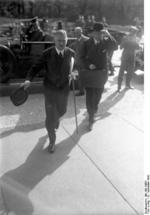
Germany
- A new session of the German Reichstag began with Hermann Göring as its president. German Chancellor Franz von Papen attempted to issue the order to dissolve the Reichstag, but Göring pretended to not see him, and instead conducted a vote that effectively made Papen's order to dissolve the Reichstag useless. ww2dbase [Reichstag Building and Kroll Opera House | Hermann Göring | Berlin | CPC]

29 Jan 1933
Germany
Germany
- The SA organization of the Nazi Party was mobilized in Berlin, Germany to guard against what turned out to be a false rumor of a coup d'état against Adolf Hitler's attempt to become the German Chancellor. ww2dbase [Berlin | CPC]
30 Jan 1933
Germany
Germany
- Adolf Hitler was named the Chancellor of Germany; three of the eleven cabinet posts were given to Nazi Party members. President Paul von Hindenburg required Vice Chancellor Franz von Papen to accompany Hitler for all meetings between the President and the Chancellor, thinking that would be sufficient to prevent Hitler from committing any drastic changes. As soon as 1700 hours on the very same day, Hitler made his first bid for greater power by demanding a re-election of the Reichstag, a motion which was defeated at this time. ww2dbase [Adolf Hitler | Berlin | CPC]
2 Feb 1933
Germany
Germany
- In Berlin, Germany, Adolf Hitler met with top military leaders, ensuring that he would cooperate with the military, easing their fears that the Nazi SA organization would one day overtake the traditional military. On the same day, he attended the premiere of the film "Dawn" which was set in a doomed German submarine and was about sacrifice in war. ww2dbase [Adolf Hitler | Berlin | AC]
27 Feb 1933
Germany
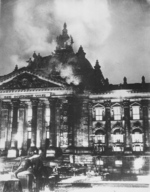
Germany
- The German Reichstag building was destroyed by fire. 10,000 political opponents of the Nazi Party, mostly communists, were subsequently arrested. ww2dbase [The Reichstag Fire | Reichstag Building and Kroll Opera House | Berlin | CPC]

5 Apr 1933
Germany
Germany
1 May 1933
Germany
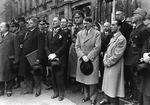
Germany
- The noted academic, Carl Schmitt, Professor of Law at Berlin University in Germany, joined the National Socialist Party. It was through his influence that so many German academics and lawyers would be exulted to accept the new order. ww2dbase [Berlin | AC]

28 Feb 1934
Germany
Germany
- At a conference in the Great Hall of the Army General Staff Building on Bendlerstrasse, Berlin, Germany, Hitler told the assembled senior Army and SA officers in no uncertain terms that the Army would be the sole bearer of arms, although for the time being the SA would continue its frontier protection duties and paramilitary training. In addition Hitler informed the delegates that the Army must be organized to carry out training to be ready for a defensive war in five years and a war of aggression in eight years. ww2dbase [Adolf Hitler | Berlin | AC]
24 Apr 1934
Germany
Germany
29 Jun 1934
Germany
Germany
- Generalleutnant Ewald von Kleis flew to Berlin, Germany to warn General Werner von Fritsch of the impending violence between the SS and SA organizations of the Nazi Party. When Fritsch informed Walther von Reichenau at the Defence Ministry the latter simply replied that it was "too late now". ww2dbase [Paul von Kleist | Berlin | AC]
30 Jun 1934
Germany
Germany
13 Nov 1934
Germany
Germany
- Nazi Party Christians held a rally at the Sportpalast in Berlin, Germany, during which party officially announced what amounted to the Nazification of Christianity. ww2dbase [Berlin | CPC]
8 Jan 1935
Germany
Germany
- The Gestapo prison Columbia-Haus in Berlin, Germany became a concentration camp. ww2dbase [Discovery of Concentration Camps and the Holocaust | Berlin | CPC]
13 Jun 1935
Germany
Germany
- Karl-Otto Koch was made the commandant of Columbia Concentration Camp in Berlin, Germany. ww2dbase [Discovery of Concentration Camps and the Holocaust | Karl-Otto Koch | Berlin | CPC]
1 Apr 1936
Germany
Germany
- Karl-Otto Koch stepped down as the commandant of Columbia Concentration Camp in Berlin, Germany. ww2dbase [Discovery of Concentration Camps and the Holocaust | Karl-Otto Koch | Berlin | CPC]
1 Aug 1936
Germany
Germany
- The 1936 Olympic Games started in Berlin, Germany; anti-Semitic posters were temporarily removed for the duration of the events. ww2dbase [Discovery of Concentration Camps and the Holocaust | Berlin | TH]
9 Aug 1936
Germany
Germany
- During the Summer Olympic Games in Berlin, Germany, Jesse Owens won his fourth gold medal, becoming the first American to win four medals in one Olympiad. Owens commented that Adolf Hitler, although biased against people of African descent, rose and waved at him as he paraded with other medal winners before the German leader; Franklin Roosevelt, however, "didn't even send me a telegram." ww2dbase [Berlin | CPC]
6 Oct 1936
Germany
Germany
- Oswald Mosley married Diana Mitford in secret at the home of Joseph Goebbels in Berlin, Germany. Their guests included Adolf Hitler. ww2dbase [Oswald Mosley | Berlin | CPC]
5 Nov 1936
Germany
Germany
- Columbia-Haus Concentration Camp in Berlin, Germany was closed. ww2dbase [Discovery of Concentration Camps and the Holocaust | Berlin | CPC]
30 Jan 1937
Germany
Germany
- The Enabling Act of Mar 1933 was renewed by the German Reichstag even though Frick's Interior Ministry had wanted the government to have a larger say, and the Reichstag to give formal assent to new laws. The formal legal principle was retained that laws were, in theory, approved by "the Reich government as a collegium", and not by Hitler alone (this despite the fact that Hitler had long abandoned any pretence what the State was governed by a collective leadership, and instead issued decrees and directives on his own behalf). In a speech to the Reichstag upon the renewal, Hitler formally declared the German withdrawal from the Treaty of Versailles. ww2dbase [Adolf Hitler | Berlin | AC]
27 Jun 1937
Germany
Germany
- Pastor Martin Niemöller delivered an outspoken sermon in Berlin, Germany in which he made it clear that a Christian's obligation was to "obey God rather than man". Arrested for anti-state activity he was sentenced to seven months in prison in Mar 1938, after which Hitler had him committed to a Concentration Camp, from which he emerged alive in 1945. ww2dbase [Berlin | AC]
4 Oct 1937
Germany
Germany
- Hitler issued a comprehensive law for "the reconstruction of German cities", with priority being given to the rebuilding of Berlin. ww2dbase [Adolf Hitler | Berlin | AC]
20 Jan 1938
Germany
Germany
- Werner von Blomberg took a break from his honeymoon in Capri, Italy and returned to his office in Berlin, Germany. ww2dbase [Werner von Blomberg | Berlin | CPC]
4 Feb 1938
Germany
Germany
- Walther von Brauchitsch was promoted to the rank of colonel general (generaloberst) and was made the Commander-in-Chief of the German Army. ww2dbase [Walther von Brauchitsch | Berlin | CPC]
21 May 1938
Germany
Germany
- British Ambassador Nevile Henderson met with German Foreign Minister Joachim von Ribbentrop twice in Berlin, Germany on this date in regards to the tension over Czechoslovakia. British Foreign Minister Lord Halifax likewise met with German Ambassador Herbert von Dirksen in Berlin, Germany. ww2dbase [Munich Conference and the Annexation of Sudetenland | Berlin | CPC]
30 May 1938
Germany
Germany
- Chinese Ambassador to Germany Cheng Tianfang's resignation was accepted by the Chinese foreign ministry. ww2dbase [Cheng Tianfang | Berlin | CPC]
8 Jun 1938
Germany
Germany
- German businessman John Rabe sent a letter, a detailed report, and a roll of film (shot by US missionary George Fitch) to Adolf Hitler in the hopes that Germany would be able to influence Japan to cease the brutal treatment of the Chinese population. Rabe was unexpected threatened by the Gestapo several days later, warning him to remain quiet on this topic. ww2dbase [Battle of Nanjing and the Rape of Nanjing | Berlin | CPC]
6 Aug 1938
Germany
Germany
- British Ambassador to Germany Nevile Henderson noted to German diplomats that the United Kingdom would not risk British lives over Czechoslovakia. ww2dbase [Munich Conference and the Annexation of Sudetenland | Berlin | CPC]
18 Aug 1938
Germany
Germany
- In Berlin, Germany, Colonel-General Ludwig Beck was forced to resign as Chief of the Army General Staff because of his consistent opposition to Adolf Hitler's decision to attack Czechosovakia. ww2dbase [Ludwig Beck | Berlin | AC]
26 Sep 1938
Germany
Germany
- Adolf Hitler spoke at the Berlin Sportpalast in Germany, claiming that whether Europe was to go into war or remain in peace, it was now up to Czechoslovakian President Edvard Beneš. He also announced that Sudetenland was to be Germany's last territorial demand in Europe. In the United States, President Franklin Roosevelt sent Hitler a message in an attempt to maintain peace. Also on this day, French General Maurice Gamelin told Britain that France possess enough strength to overwhelm German defenses should France go to war over German threats on Czechoslovakia. ww2dbase [Munich Conference and the Annexation of Sudetenland | Berlin | CPC]
27 Sep 1938
Germany
Germany
- In the early afternoon, Adolf Hitler moved several divisions to the German-Czechoslovakian border. In the late afternoon, he called for a military parade on the Unter den Linden boulevard in Berlin, Germany to rouse a patriotic sentiment; Berlin citizens responded coolly, however. In the United Kingdom, British military mobilized for war, school children were evacuated from London, while trenches were dug in the city's parks. British Prime Minister Neville Chamberlain recommended Czechoslovakian President Edvard Beneš to accept a partial military occupation of Sudetenland by the Germans. In the United States, President Franklin Roosevelt called for an international conference in an attempt to maintain peace. The King of Sweden also attempted to calm Hitler down, sending him a message advising him that German's current strength was no match for the combined strength of the opposing powers. Even the chief of the German Navy Erich Raeder attempted to convince Hitler to not provoke war. Late in the day, Czechoslovakia finally received some foreign support when Yugoslavia and Romania declared that they would offer military assistance should Hungary use force against Czechoslovakia. ww2dbase [Munich Conference and the Annexation of Sudetenland | Berlin | CPC]
18 Dec 1938
Germany
Germany
- German scientist Otto Hahn split the uranium atom at the Kaiser Wilhelm Institute for Chemistry in Berlin, Germany. ww2dbase [Berlin | CPC]
21 Jan 1939
Germany
Germany
- Czechoslovakian foreign minister visited Adolf Hitler in Berlin, Germany; Hitler demanded Czechoslovakia to decrease the size of its military, to hand over a large portion of its gold reserves to be stored in Germany, and to begin excluding Jews in society. ww2dbase [Dismemberment of Czechoslovakia | Berlin | CPC]
12 Feb 1939
Germany
Germany
- Slovakian nationalist leader Vojtech Tuka met with Adolf Hitler in Berlin, Germany, seeking support for Slovakian independence. Hitler answered in the affirmative. ww2dbase [Dismemberment of Czechoslovakia | Berlin | CPC]
15 Mar 1939
Germany
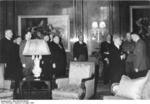
Germany
- At 0115 hours, Czechoslovakian President Emil Hácha met with Adolf Hitler, who was accompanied by Wilhelm Keitel, Hermann Göring, Joachim von Ribbentrop, and Theodor Morell, in Berlin, Germany. Hitler threatened Hácha that German forces were poised to invade Czechoslovakia at 0600 hours, so it was up to Hácha to either agree to a peaceful occupation or face a destructive invasion. At 0215 hours, Hitler left the conference room, and Göring and Ribbentrop continued to threaten Hácha with, among other things, the bombing of Prague. Hácha fainted twice during the negotiations, and both times were revived by injections by Dr. Morell. Hácha gave in at 0355 hours, and German troops marched across the borders at 0600 hours unopposed. In the evening, Adolf Hitler entered Prague in a grand parade. During the day in eastern Czechoslovakia, Hungarian forces marched into Ruthenia, ending the one-day-old nation of Capatho-Ukraine. ww2dbase [Dismemberment of Czechoslovakia | Berlin | CPC]

23 Mar 1939
Germany
Germany
- Joachim von Ribbentrop and Vojtech Tuka signed the official document in Berlin, Germany that declared Slovakia as an independent nation under German protection. ww2dbase [Dismemberment of Czechoslovakia | Berlin | CPC]
24 Mar 1939
Germany
Germany
- Adolf Hitler returned from recently annexed Memel to Berlin, Germany. ww2dbase [Adolf Hitler | Berlin | CPC]
20 Apr 1939
Germany
Germany
- Italian Ambassador in Berlin, Germany, Attalico, sent a message to Rome, Italy, noting that war between Germany and Poland seemed imminent. ww2dbase [The Danzig Crisis | Berlin | CPC]
7 May 1939
Germany
Germany
- The French ambassador in Berlin, Germany dispatched a warning to French leadership of deteriorating German-Polish relations. ww2dbase [The Danzig Crisis | Berlin | CPC]
9 May 1939
Germany
Germany
- The French ambassador in Berlin, Germany dispatched another warning to French leadership, noting that he had reasons to believe that Adolf Hitler was presenting or was about to present a plan to Joseph Stalin for the partition of Poland. ww2dbase [The Danzig Crisis | Berlin | CPC]
22 May 1939
Germany
Germany
- Italy and Germany signed the "Pact of Steel" in Berlin, Germany. ww2dbase [The Pact of Steel | Berlin | TH]
28 May 1939
Germany
Germany
- The Italian Foreign Minister Count Galeazzo Ciano visited Berlin, Germany where he was given a great reception in his honour by Adolf Hitler. ww2dbase [Galeazzo Ciano | Berlin | AC]
7 Jun 1939
Germany
Germany
- In the German capital of Berlin, Germany signed separate non-aggression pacts with Latvia and Estonia. The documents were signed for Germany by Foreign Minister Joachim von Ribbentrop; Foreign Minister Vilhelms Munters signed for Latvia, and Foreign Minister Karl Selter signed for Estonia. ww2dbase [Berlin | CPC]
26 Jul 1939
Germany
Germany
- Low level German and Soviet diplomats had a friendly dinner together in Berlin, Germany, their discussions lasting a little after midnight. They concluded that a treaty between Germany and Soviet would mean peace in Eastern Europe, and that the Soviet Union should be aware of the United Kingdom, whose aggressiveness would undoubtedly drag the Soviet Union into a war should the two countries sign any military agreement with each other. ww2dbase [Molotov-Ribbentrop Pact | Berlin | CPC]
4 Aug 1939
Germany
Germany
- The German expedition team consisting of Ernst Schäfer, Bruno Beger, Karl Wienert, Ernst Krause, and others, having departed Lhasa, Tibet in Aug 1939, arrived in Berlin, Germany. ww2dbase [Berlin | CPC]
22 Aug 1939
Germany
Germany
- Joachim von Ribbentrop and the German delegation departed Berlin, Germany aboard two Condor aircraft for Königsberg, East Prussia, Germany. ww2dbase [Molotov-Ribbentrop Pact | Berlin | CPC]
24 Aug 1939
Germany
Germany
- In Berlin, Germany, journalist William Shirer noted in his diary "it looks like war" based on his observations throughout the day. ww2dbase [Invasion of Poland | Berlin | CPC]
25 Aug 1939
Germany
Germany
- Joachim von Ribbentrop arrived in Berlin, Germany. ww2dbase [Joachim von Ribbentrop | Berlin | CPC]
26 Aug 1939
Germany
Germany
- The German Foreign Minister, Joachim von Ribbentrop, handed the British Ambassador, Sir Neville Henderson, a list of terms that would allegedly ensure peace. These terms stipulated that Danzig would be returned to Germany, there would be a plebiscite in the Polish Corridor based on 1919 residency and there would also be an exchange of minority populations between Poland and Germany. The British thought these were fair demands and so the Polish Ambassador Józef Lipski went to see Ribbentrop, but was thrown out when he revealed that he did not have the power to sign the agreement. Germany then announced that Poland had refused its fair demands. ww2dbase [Joachim von Ribbentrop | Berlin | AC]
28 Aug 1939
Germany
Germany
- Citizens in Berlin, Germany observed troops moving toward the east. ww2dbase [Invasion of Poland | Berlin | CPC]
31 Aug 1939
Germany
Germany
- German official Hermann Göring hosted British Ambassador Nevile Henderson and Swedish businessman Birger Dahlerus at his home in Berlin, Germany for tea between 1700 and 1900 hours, during which the latter two made a last attempt to broker peace. ww2dbase [Hermann Göring | Berlin | CPC]
3 Sep 1939
Germany
Germany
- At 0900 hours, British Ambassador in Germany Nevile Henderson delivered the British declaration of war to German Foreign Minister Joachim von Ribbentrop, effective at 1100 hours; British Commonwealth nations of New Zealand and Australia followed suit. France would also declare war later on this day, effective at 1700 hours. In the afternoon, Adolf Hitler issued an order to his generals, again stressing that German troops must not attack British and French positions. Finally, Hitler also sent a message to the Soviet Union, asking the Soviets to jointly invade Poland. ww2dbase [Invasion of Poland | Berlin | TH]
- Adolf Hitler departed Berlin, Germany for the Eastern Front. ww2dbase [Adolf Hitler | Berlin | CPC]
26 Sep 1939
Germany
Germany
- Former German Army Commander-in-Chief Werner von Fritsch was buried in Berlin, Germany. Neither Adolf Hitler, nor Joachim von Ribbertrop, nor Heinrich Himmler attended the ceremonial state funeral. ww2dbase [Werner von Fritsch | Berlin | AC]
1 Oct 1939
Germany
Germany
- Galeazzo Ciano met with Adolf Hitler in Berlin, Germany. ww2dbase [Galeazzo Ciano | Berlin | CPC]
6 Oct 1939
Germany
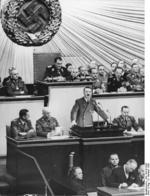
Germany
- In a speech at the Reichstag in Berlin, Germany, Adolf Hitler noted that he did not wish to wage war against France and the United Kingdom, and it would not be worth the blood of British, French, and German soldiers for Poland, since it was created unjustly by the Versailles Treaty. He proposed a multi-power conference to achieve peace. ww2dbase [Adolf Hitler | Berlin | CPC]

11 Oct 1939
Germany
Germany
- The radio station in Berlin, Germany reported the false rumor of the fall of the British government, and that the new government was to offer Germany peace terms. "Old women in the vegetable markets tossed their cabbages into the air, wrecked their stands in sheer joy and made for the nearest pub to toast the peace", reported journalist William Shirer. ww2dbase [Berlin | CPC]
21 Oct 1939
Germany
Germany
- General Erich von Manstein, Chief of Staff of Army Group A, obtained a copy of Plan Yellow whilst passing through Berlin, Germany on his way to set up Army Group A Headquarters at Koblenz. He found little to admire in the plan, considering it to be too much like the strategy of 1914, and even predicting that the advance would bog down at the same place – on the Somme River in France. ww2dbase [Erich von Manstein | Berlin | AC]
23 Oct 1939
Germany
Germany
- On being told by Admiral Erich Raeder that he lacked adequate support from both the civil administration and the other two military branches, Adolf Hitler sent a memorandum to the Air Force and Army Commanders-in-Chiefs as well as to the Ministers concerned. The memo made it clear that "All measures for attacking the merchant shipping and economic resources of Great Britain were to be directed through the O.K.W. (Oberkommando der Wehrmacht)." This gave Raeder the chance to press for a relaxation of the restrictions on sinking neutral vessels trading with England. Hitler however remained adamant that any incidents should be forbidden until he was ready to strike on land. He told the admiral that he was worried about the name of the heavy cruiser Deutschland. As soon as she arrived back her name was to be changed to Lützow. "Should she be sunk with her present name it would have serious repercussions back home." Hitler then ordered a meeting of Naval Staff in Berlin, Germany on 1 Nov 1939. ww2dbase [Start of the Battle of the Atlantic | Adolf Hitler | Erich Raeder | Deutschland | Berlin | HM]
1 Nov 1939
Germany
Germany
- In a meeting with General Wilhelm Keitel and Lieutenant Commander Karl-Jesko von Puttkamer, Adolf Hitler's liaison officer with the Naval War Staff in Berlin, Hitler repeatedly told the officers that the name of the cruiser Deutschland should be changed and the ship was to avoid any action the same orders were to be issued to the Scharnhorst and the Gneisenau. Hitler was worried that any action would bring out the British Grand Fleet before air protection was organised. The Graf Spee, on station in the South Atlantic was to be ordered to be ready to sail to the Indian Ocean. Any operations of battleships must be held until Italy entered the war and the British Forces consequently held down. Submarine warfare was to be intensified. Passenger ships could be attacked and neutral ships would be attacked once a state of siege be declared against Britain. Hitler would not give priority to the production of submarines however, as Army equipment and ammunition supplies were of prime importance. Erich Raeder sent a copy to Admiral Karl Dönitz, Commander of the Submarine Arm with a note saying that in order to carry out a large scale submarine war then continuous pressure would be necessary. ww2dbase [Start of the Battle of the Atlantic | Adolf Hitler | Erich Raeder | Wilhelm Keitel | Deutschland | Berlin | HM]
7 Nov 1939
Germany
Germany
- Hermann Göring met with American journalists at the Soviet embassy in Berlin, Germany and mocked the quality and quantity of the US-built aircraft that would soon arrive in Britain. ww2dbase [Hermann Göring | Berlin | CPC]
14 Dec 1939
Germany
Germany
- Vidkun Quisling met with Adolf Hitler in Berlin, Germany. ww2dbase [Vidkun Quisling | Berlin | CPC]
16 Dec 1939
Germany
Germany
- Vidkun Quisling met with Adolf Hitler in Berlin, Germany. ww2dbase [Vidkun Quisling | Berlin | CPC]
18 Dec 1939
Germany
Germany
- Vidkun Quisling met with Adolf Hitler in Berlin, Germany. ww2dbase [Adolf Hitler | Vidkun Quisling | Berlin | CPC]
1 Mar 1940
Germany
Germany
- US Undersecretary of State Sumner Welles arrived in Berlin, Germany on a peace mission, and met with German Foreign Minister Joachim von Ribbentrop on the first day of his visit. ww2dbase [Joachim von Ribbentrop | Berlin | TH]
2 Mar 1940
Germany
Germany
- Adolf Hitler met with US Under Secretary of State Sumner Welles in Berlin, Germany. ww2dbase [Adolf Hitler | Berlin | CPC]
3 Mar 1940
Germany
Germany
- Hermann Göring met with US Under Secretary of State Sumner Welles in Berlin, Germany. ww2dbase [Hermann Göring | Berlin | CPC]
4 Mar 1940
Germany
Germany
- US Undersecretary of State Sumner Welles departed Berlin, Germany. ww2dbase [Berlin | CPC]
19 Mar 1940
Germany
Germany
- Yosuke Matsuoka departed Berlin, Germany. ww2dbase [Yosuke Matsuoka | Berlin | CPC]
5 Apr 1940
Germany
Germany
- Norwegian ambassador in Berlin warned Danish and Norwegian capitals of a possible invasion, as did British intelligence. ww2dbase [Invasion of Denmark and Norway | Berlin | CPC]
9 May 1940
Germany
Germany
- Adolf Hitler issued the order to commence the invasion of France and the Low Countries at dawn on the following day. At noon German meteorologists made a firm forecast of clear skies on the following morning; Adolf Hitler gave the meteorology officer a medal on the spot. In the afternoon, Hitler departed Berlin, Germany for this temporary forward headquarters codenamed Felsennest near Bad Münsereifel in the Rhineland region of Germany to observe the coming invasion. ww2dbase [Invasion of France and the Low Countries | Adolf Hitler | Berlin | CPC, AC]
7 Jun 1940
Germany
Germany
- A French Navy NC.223 aircraft became the first Allied bomber to bomb Berlin, Germany. ww2dbase [F.220 | Bombing of Hamburg, Dresden, and Other Cities | Berlin | TH, CPC]
10 Jun 1940
Germany
Germany
- A French Navy NC.223 aircraft bombed Berlin, Germany. ww2dbase [F.220 | Bombing of Hamburg, Dresden, and Other Cities | Berlin | CPC]
5 Jul 1940
Germany
Germany
- Adolf Hitler departed from his headquarters at Tannenberg in southern Germany, returning to Berlin. ww2dbase [Adolf Hitler | Berlin | CPC]
19 Jul 1940
Germany
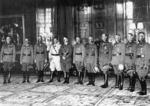
Germany
- Adolf Hitler spoke to the Reichstag at the Kroll Opera House in Berlin, Germany about Allied warmongering and asked the United Kingdom to listen to reason and avoid war. Within an hour of the conclusion of the speech, the BBC broadcast an unofficial rejection to Hitler's bid for peace. ww2dbase [Reichstag Building and Kroll Opera House | Adolf Hitler | Berlin | TH, CPC]
- Günther von Kluge was promoted to the rank of Field Marshal at the Kroll Opera House in Berlin, Germany. ww2dbase [Reichstag Building and Kroll Opera House | Günther von Kluge | Berlin | CPC]
- Hermann Göring was promoted to the rank of Reichsmarschall, a rank created for him so that he would outrank all Field Marshals of the German military. The ceremony took place at the Kroll Opera House in Berlin, Germany. ww2dbase [Reichstag Building and Kroll Opera House | Hermann Göring | Berlin | CPC]
- Hugo Sperrle was promoted to the rank of Generalfeldmarschall at the Kroll Opera House in Berlin, Germany. ww2dbase [Reichstag Building and Kroll Opera House | Hugo Sperrle | Berlin | CPC]
- Wilhelm Keitel was promoted to the rank of Generalfeldmarschall at the Kroll Opera House in Berlin, Germany. ww2dbase [Reichstag Building and Kroll Opera House | Wilhelm Keitel | Berlin | CPC]
- Walther von Brauchitsch was promoted to the rank of field marshal (generalfeldmarschall) at the Kroll Opera House in Berlin, Germany. ww2dbase [Reichstag Building and Kroll Opera House | Walther von Brauchitsch | Berlin | CPC]

17 Aug 1940
Germany
Germany
23 Aug 1940
Germany
Germany
- The British RAF flew a retaliation strike against Berlin, Germany. ww2dbase [Bombing of Hamburg, Dresden, and Other Cities | Berlin | CPC]
25 Aug 1940
Germany
Germany
- 81 British Hampden bombers of No. 49 and No. 50 Squadrons attacked Berlin, Germany in the first retaliation attack for the raid on London, England. Clouds led to bombs falling largely in suburban lawns and gardens, killing only 6. Nevertheles, Luftwaffe chief Hermann Göring was shocked and embarrassed that the British bombers were able to get through in such great numbers. ww2dbase [Bombing of Hamburg, Dresden, and Other Cities | Berlin | TH]
28 Aug 1940
Germany
Germany
- Overnight, British bombers attacked Berlin, Germany, damaging Görlitzer railway station, killing 8 and wounding 21. ww2dbase [Bombing of Hamburg, Dresden, and Other Cities | Berlin | CPC]
30 Aug 1940
Germany
Germany
- RAF Bomber Command aircraft attacked Berlin, Germany. ww2dbase [Bombing of Hamburg, Dresden, and Other Cities | Berlin | CPC]
4 Sep 1940
Germany
Germany
- Adolf Hitler addressed a crowd of factory workers, nurses, and relief workers during the Winter Relief Campaign at the Berlin Sportpalast, declaring that Germany would now answer British night raids on German cities with greater ferocity. ww2dbase [Battle of Britain | Adolf Hitler | Berlin | CPC]
23 Sep 1940
Germany
Germany
- The British RAF Bomber Command sent 129 bombers for a night raid against Berlin, Germany, causing minimal damage. ww2dbase [Bombing of Hamburg, Dresden, and Other Cities | Berlin | TH]
- Werner Mölders was presented Oak Leaves to his Knight's Cross medal by Adolf Hitler in Berlin, Germany. ww2dbase [Werner Mölders | Berlin | CPC]
25 Oct 1940
Germany
Germany
- British bombers attacked Hamburg and Berlin in Germany, causing heavy casualties. ww2dbase [Bombing of Hamburg, Dresden, and Other Cities | Berlin | CPC]
29 Oct 1940
Germany
Germany
- The British RAF conducted the 25th raid on Berlin, Germany. ww2dbase [Bombing of Hamburg, Dresden, and Other Cities | Berlin | TH]
12 Nov 1940
Germany

Germany
- Soviet Foreign Minister Molotov arrived in Berlin, Germany for discussions about spheres of influence in the Balkan Peninsula and in Finland. In the morning, German Foreign Minister Ribbentrop reassured Molotov that Germany had no further interest in eastern and southern Europe. In the afternoon, Molotov met with Adolf Hitler and relayed Joseph Stalin's request for Hitler to explain the recently formed German-Italian-Japanese military alliance and the recent German move into Romania; before Hitler gave a concrete answer, he noted that as the hour was getting late, the risk of British bombing was getting greater, thus the meeting should be broken up. ww2dbase [Vyacheslav Molotov | Berlin | TH]
- Having realized that his staff made plans to move visiting Soviet Foreign Minister Vyacheslav Molotov to bomb shelters in case Allied bombers attacked Berlin, Adolf Hitler realized that the Reich Chancellery in Berlin, Germany did not have an adequate bunker, and immediate ordered for a plan to be drawn up. Digging would begin in the middle of the Chancellery garden in 1943, but the construction would never be finished. ww2dbase [Adolf Hitler | Berlin | CPC]

23 Nov 1940
Germany
Germany
- Ion Antonescu of Romania signed the Tripartite Pact in Berlin, Germany. ww2dbase [The Tripartite Pact | Berlin | TH]
21 Dec 1940
Germany
Germany
- Berlin, Germany suffered minor damage from a British RAF bombing raid. ww2dbase [Bombing of Hamburg, Dresden, and Other Cities | Berlin | TH]
27 Dec 1940
Germany
Germany
- Erich Raedar met with Adolf Hitler in Berlin, Germany. ww2dbase [Erich Raeder | Berlin | CPC]
16 Jan 1941
Germany
Germany
- Hans-Joachim Marseille began a period of rest at home in Berlin, Germany. ww2dbase [Hans-Joachim Marseille | Berlin | CPC]
27 Feb 1941
Germany
Germany
- Yosuke Matsuoka arrived in Berlin, Germany. ww2dbase [Yosuke Matsuoka | Berlin | CPC]
20 Mar 1941
Germany
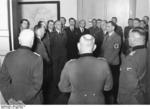
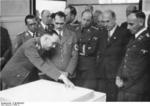
Germany
- Heinrich Himmler, Rudolf Heß, Fritz Todt, Reinhard Heydrich, and other top Nazi German official met in Berlin, Germany to discuss plans for resettling Eastern Europe with Germans. ww2dbase [Heinrich Himmler | Fritz Todt | Berlin | CPC]


24 Mar 1941
Germany
Germany
- The RAF conducted its first bombing raid on Berlin, Germany for the year. ww2dbase [Bombing of Hamburg, Dresden, and Other Cities | Berlin | TH]
26 Mar 1941
Germany
Germany
- Japanese Foreign Minister Yosuke Matsuoka arrived in Berlin, Germany. He was not met by Joachim von Ribbentrop immediately as his German counterpart was busy with the recent political developments in Yugoslavia. ww2dbase [Yosuke Matsuoka | Berlin | CPC]
27 Mar 1941
Germany
Germany
- Japanese Foreign Minister Yosuke Matsuoka met with German Foreign Minister Joachim von Ribbentrop in Berlin, Germany in the morning; Ribbentrop noted to Matsuoka that the United States was intimidated by the Axis alliance thus would not enter into the war even if Japan joined in to strike at British possessions in Asia. In the afternoon, Matsuoka met with Adolf Hitler. ww2dbase [Yosuke Matsuoka | Berlin | CPC]
28 Mar 1941
Germany
Germany
- Japanese Foreign Minister Yosuke Matsuoka again met with German Foreign Minister Joachim von Ribbentrop in Berlin, Germany. ww2dbase [Yosuke Matsuoka | Berlin | CPC]
- Before dawn in Berlin, Germany, General Franz Halder completed the German invasion plan for Yugoslavia. ww2dbase [Franz Halder | Berlin | CPC]
29 Mar 1941
Germany
Germany
- Japanese Foreign Minister Yosuke Matsuoka again met with German Foreign Minister Joachim von Ribbentrop in Berlin, Germany. Ribbentrop offered Matsuoka that, should the Soviet Union attack Japan while Japan embarked on a military campaign against British possessions in Asia, Germany would lend military assistance. Matsuoka countered, noting that the Soviet Union seemed to be friendly toward Japan. ww2dbase [Soviet-Japanese Neutrality Pact | Berlin | CPC]
30 Mar 1941
Germany
Germany
- In a lengthy speech in the Cabinet Room of the Chancellery in Berlin, Germany, Hitler told his assembled commanders of his intention to "exterminate" communism "for all time". ww2dbase [Reich Chancellery | Adolf Hitler | Berlin | AC]
2 Apr 1941
Germany
Germany
- Subhash Chandra Bose arrived in Berlin, Germany. ww2dbase [Subhash Chandra Bose | Berlin | CPC]
10 Apr 1941
Germany
Germany
- Overnight, RAF aircraft attacked Berlin, Germany, destroying the historical Opera House. It would be restored by 1943, but would again be bombed in Feb 1945. ww2dbase [Bombing of Hamburg, Dresden, and Other Cities | Berlin | CPC]
28 Apr 1941
Germany
Germany
- In Berlin, Germany, German ambassador to the Soviet Union Friedrich Werner von der Schulenburg attempted to convince Adolf Hitler that the Soviet Union was generally friendly toward Germany, and the two nations could achieve greater friendship by working closer together. ww2dbase [Berlin | CPC]
13 Jun 1941
Germany
Germany
- Walther von Brauchitsch returned to Berlin, Germany from an inspection of invasion forces in Poland. ww2dbase [Walther von Brauchitsch | Berlin | CPC]
28 Jun 1941
Germany
Germany
- Joachim von Ribbentrop sent a message to the Japanese embassy in Berlin, Germany, asking the Japanese to jointly invade the Soviet Union by tearing up the Soviet-Japanese Neutrality Pact and attack Vladivostok, Russia. ww2dbase [Joachim von Ribbentrop | Berlin | CPC]
- Chen Jie submitted a letter to the German government, noting the long standing friendly Sino-German relationship, urging Germany to abandon its wish to recognize the Japanese puppet regime in China under Wang Jingwei. ww2dbase [Chen Jie | Berlin | CPC]
2 Jul 1941
Germany
Germany
10 Jul 1941
Germany
Germany
20 Jul 1941
Germany
Germany
- Werner Mölders was promoted to the rank of Oberst and was transferred to the Reich Air Ministry in Berlin, Germany. ww2dbase [Werner Mölders | Berlin | CPC]
22 Jul 1941
Germany
Germany
- The German News Bureau in Berlin, Germany reported to the public that the Soviet capital of Moscow had been attacked by German bombers for the first time during the previous night; the aircraft were launched from captured airfields within a few hundred miles from the city. Meanwhile, the German High Command announced that the bombing of Moscow was done in retaliation for Soviet bombings on Bucharest, Romania and Helsinki, Finland. ww2dbase [Battle of Moscow | Berlin | CPC]
8 Aug 1941
Germany
Germany
- During the night, the first Soviet air attack was made on Berlin, Germany by naval Ilyushin Il-4 twin-engine bombers. ww2dbase [Bombing of Hamburg, Dresden, and Other Cities | Berlin | AC]
3 Oct 1941
Germany
Germany
- At the Berliner Sportpalast in the German capital, Adolf Hitler announced during a rally that the Germans had captured 2,500,000 Soviet prisoners of war, destroyed or captured 22,000 guns, destroyed or captured 18,000 tanks, destroyed 14,500 aircraft, and since 1939 had expanded Germany by an area four times as large as Britain. He stressed that the Soviet Union had been broken and would never rise again. ww2dbase [Adolf Hitler | Berlin | TH]
7 Nov 1941
Germany
Germany
- After dark, 160 British RAF bombers attacked Berlin, Germany. 20 bombers were shot down. The Germans reported minimal damage. ww2dbase [Bombing of Hamburg, Dresden, and Other Cities | Berlin | CPC]
28 Nov 1941
Germany
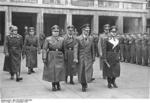
Germany
- A state funeral was held for Werner Mölders in Berlin, Germany. ww2dbase [Werner Mölders | Berlin | CPC]
- Joachim von Ribbentrop met with Hiroshi Oshima in Berlin, Germany, promising that Germany would declare war on the United States should Japan and the US enter a state of war; Ribbentrop, however, did not know Japan was planning on starting the war soon. ww2dbase [Joachim von Ribbentrop | Berlin | CPC]
- Grand Mufti of Jerusalem Haj Amin al-Husseini arrived in Berlin, Germany. ww2dbase [Berlin | CPC]

30 Nov 1941
Germany
Germany
- The Japanese ambassador in Germany Hiroshi Oshima was informed by his superiors that war with the United States was near, and he was to inform Adolf Hitler and Joachim von Ribbentrop of such news. ww2dbase [Hiroshi Oshima | Berlin | CPC]
9 Dec 1941
Germany
Germany
- Adolf Hitler arrived in Berlin, Germany at 1100 hours. He decided to declare war on the United States on this date, but decided to withhold the announcement until 11 Dec in order to have enough time to draft his speech. ww2dbase [Adolf Hitler | Berlin | CPC]
18 Jan 1942
Germany
Germany
- German and Italy signed two secret military agreements with Japan in Berlin, Germany, one with the Japanese Army and the other with the Japanese Navy. The two agreement divided the world into two operational zones along the 70th meridian east longitude line, the west of which would be under the operational jurisdiction of Germany and Italy, and east of which of Japan. The agreements also committed the three powers to intelligence sharing. ww2dbase [Berlin | TH, CPC]
20 Jan 1942
Germany
Germany
- SS-Gruppenführer Heydrich hosted the Wannsee Conference at a villa in the suburbs of Berlin, Germany to discuss the Final Solution. ww2dbase [Wannsee Conference | Reinhard Heydrich | Berlin | CPC]
24 Jan 1942
Germany
Germany
- Hans-Joachim Marseille departed Berlin, Germany. ww2dbase [Hans-Joachim Marseille | Berlin | CPC]
28 Jan 1942
Germany
Germany
- In Berlin, Germany, fighter ace Adolf Galland was awarded Diamonds to his Knight's Cross by Adolf Hitler for achieving 94 kills. ww2dbase [Adolf Galland | Berlin | AC]
30 Jan 1942
Germany
Germany
- Adolf Hitler spoke at the Berlin Sports Palace, threatening the Jews of the world with annihilation. ww2dbase [Adolf Hitler | Berlin | CPC]
13 Feb 1942
Germany
Germany
- Vidkun Quisling arrived in Berlin, Germany. ww2dbase [Vidkun Quisling | Berlin | TH]
18 Feb 1942
Germany
Germany
- Germany, Italy, and Japan signed a military convention in Berlin, Germany, laying down "guidelines for common operations against the common enemies." ww2dbase [Berlin | CPC]
28 Feb 1942
Germany
Germany
- Hans-Joachim Marseille arrived in Berlin, Germany for a period of home leave. ww2dbase [Hans-Joachim Marseille | Berlin | CPC]
26 Apr 1942
Germany
Germany
- The Nazi German parliament held its final meeting at the Kroll Opera House in Berlin, Germany. ww2dbase [Reichstag Building and Kroll Opera House | Berlin | CPC]
1 May 1942
Germany
Germany
16 Jan 1943
Germany
Germany
- British bombers attacked Berlin, Germany. ww2dbase [Bombing of Hamburg, Dresden, and Other Cities | Berlin | CPC]
17 Jan 1943
Germany
Germany
- Journalist Richard Dimbleby flew in a British No. 106 Squadron Lancaster bomber over Berlin, Germany during a raid to record a live report, which was broadcast by the BBC on the following day. ww2dbase [Bombing of Hamburg, Dresden, and Other Cities | Berlin | CPC]
30 Jan 1943
Germany
Germany
- The British RAF's first daylight raid on Berlin, Germany was completed by No. 105 and No. 139 Squadrons' Mosquito aircraft. ww2dbase [Bombing of Hamburg, Dresden, and Other Cities | Berlin | AC]
28 Feb 1943
Germany
Germany
- 712 RAF aircraft (457 Lancaster, 252 Halifax, and 3 Mosquito) attacked Berlin, Germany; 20 aircraft were lost. ww2dbase [Bombing of Hamburg, Dresden, and Other Cities | Berlin | CPC]
2 Mar 1943
Germany
Germany
- Joseph Goebbels' diary entry on this date noted that "we are now definitely pushing the Jews out of Berlin" and expressing that many Jews were still in hiding in the city that needed to be found and deported. ww2dbase [Joseph Goebbels | Berlin | CPC]
21 Mar 1943
Germany
Germany
- Adolf Hitler, Hermann Göring, Wilhelm Keitel, Karl Dönitz, Heinrich Himmler, Fedor von Bock, Erhard Milch, and others visited the Zeughaus in Berlin, Germany to inspect an exhibition featuring captured Soviet weapons. It was Hitler's first public event in four months. At the Zeughaus, Colonel Rudolf von Gersdorff wore an overcoat packed with explosives with the intention of killing Hitler, but Hitler's schedule changed unexpectedly, and Hitler's early departure from the exhibition caused the assassination attempt to be called off. After departing from the exhibition, the group of German leaders attended a memorial ceremony for the Heroes' Memorial Day. ww2dbase [July Plot | Adolf Hitler | Berlin | TH, CPC]
25 May 1943
Germany
Germany
- In a conference in Berlin, Germany, Albert Speer recommended that the funding for military research be focused on the V-2 rocket program rather than being spread around a wide range of projects that included jets, heat-seeking missiles, sound-seeking torpedoes, and others. Ultimately this recommendation would be ignored. ww2dbase [V-Weapons Campaign | Albert Speer | Berlin | CPC]
26 Jul 1943
Germany
Germany
- Adolf Hitler called for Otto Skorzeny to discuss the rescue of Benito Mussolini, but Skorzeny missed the initial call as he was drinking with a friend at Hotel Eden on the Kurfürstendamm in Berlin, Germany. ww2dbase [Otto Skorzeny | Berlin | CPC]
23 Aug 1943
Germany
Germany
- 727 RAF bombers dropped 1,700 tons of explosives on Berlin, Germany. ww2dbase [Bombing of Hamburg, Dresden, and Other Cities | Berlin | TH]
31 Aug 1943
Germany
Germany
- British RAF aircraft attacked Berlin, Germany. ww2dbase [Bombing of Hamburg, Dresden, and Other Cities | Berlin | TH]
26 Sep 1943
Germany
Germany
- Otto Skorzeny presented three Knight's Cross medals at the Harvest Thanksgiving festival at the Berlin Sportpalast in Germany. In the early afternoon, he had lunch with Joseph Goebbels and his family. ww2dbase [Otto Skorzeny | Berlin | CPC]
18 Nov 1943
Germany
Germany
- RAF Bomber Command launched a concerted series of attacks on the Berlin, Germany dubbed "Operation Berlin". During the first attack, more than 700 tons of bombs were dropped. Over a five-month period, Berlin is attacked 32 times and hit by 25,000 tons of bombs, killing more than 6,000 and leaving 1.5 million homeless; RAF lost 1,047 aircraft during the five-month bombing campaign. ww2dbase [Bombing of Hamburg, Dresden, and Other Cities | Berlin | AC]
22 Nov 1943
Germany
Germany
- Berlin, Germany was heavily bombed by 764 RAF aircraft (469 Lancaster, 234 Halifax, 50 Stirling, and 11 Mosquito), dropping over 2,300 tons of explosives; 26 bombers were lost. 175,000 Germans were made homeless and the Kaiser Wilhelm Memorial Church was destroyed. ww2dbase [Bombing of Hamburg, Dresden, and Other Cities | Berlin | TH]
- The Kroll Opera House in Berlin, Germany was damaged by British bombers. ww2dbase [Bombing of Hamburg, Dresden, and Other Cities | Reichstag Building and Kroll Opera House | Berlin | CPC]
23 Nov 1943
Germany
Germany
- 383 RAF aircraft (365 Lancaster, 10 Halifax, and 8 Mosquito) attacked Berlin, Germany. ww2dbase [Bombing of Hamburg, Dresden, and Other Cities | Berlin | CPC]
24 Nov 1943
Germany
Germany
- 6 RAF Mosquito aircraft attacked Berlin, Germany; one aircraft was lost. ww2dbase [Bombing of Hamburg, Dresden, and Other Cities | Berlin | CPC]
- Before dawn, while on display at a museum in Berlin, Germany, the Do X aircraft was destroyed by British bombing. ww2dbase [Do X | Berlin | CPC]
25 Nov 1943
Germany
Germany
- RAF bombers attacked Frankfurt, Germany; 3 Mosquito aircraft attacked Berlin, Germany as diversion. ww2dbase [Bombing of Hamburg, Dresden, and Other Cities | Berlin | CPC]
26 Nov 1943
Germany
Germany
- USAAF launched its heaviest raid on Bremen, Germany, while the RAF hit Berlin, Germany for the fifth night in a row with 443 Lancaster and 7 Mosquito aircraft. Stuttgart, Germany was attacked in diversion by 84 aircraft. 34 RAF aircraft were lost during this night. ww2dbase [Bombing of Hamburg, Dresden, and Other Cities | Berlin | TH]
2 Dec 1943
Germany
Germany
- 458 RAF aircraft (425 Lancaster, 15 Halifax, and 18 Mosquito) attacked Berlin, Germany, dropping 1,500 tons of bombs; 40 bombers were lost (37 Lancaster, 2 Halifax, and 1 Mosquito). Two Siemens factories, a ball-bearing factory, and several railway installations were damaged. ww2dbase [Bombing of Hamburg, Dresden, and Other Cities | Berlin | TH]
16 Dec 1943
Germany
Germany
- 498 RAF aircraft (483 Lancaster and 15 Mosquito) attacked Berlin, Germany; 25 Lancaster bombers were lost in combat and 29 more were lost while landing in bad weather. Berlin rail system was disrupted heavily, while the National Theater and the national archives buildings were destroyed. ww2dbase [Bombing of Hamburg, Dresden, and Other Cities | Berlin | CPC]
23 Dec 1943
Germany
Germany
- 379 RAF aircraft (364 Lancaster, 7 Halifax, and 8 Mosquito) attacked Berlin, Germany; 16 Lancaster bombers were lost. ww2dbase [Bombing of Hamburg, Dresden, and Other Cities | Berlin | CPC]
29 Dec 1943
Germany
Germany
- British RAF dropped 2,000 tons of bombs on Berlin, Germany. ww2dbase [Bombing of Hamburg, Dresden, and Other Cities | Berlin | TH]
1 Jan 1944
Germany
Germany
- 421 RAF Lancaster bombers attacked Berlin, Germany; 28 aircraft were lost. 15 Mosquito aircraft attacked Hamburg in diversion. ww2dbase [Bombing of Hamburg, Dresden, and Other Cities | Berlin | CPC]
2 Jan 1944
Germany
Germany
- 383 RAF aircraft (362 Lancaster, 9 Halifax, and 12 Mosquito) attacked Berlin, Germany; 27 aircraft were lost. ww2dbase [Bombing of Hamburg, Dresden, and Other Cities | Berlin | CPC]
4 Jan 1944
Germany
Germany
- 13 British Mosquito aircraft attacked Berlin, Germany. ww2dbase [Bombing of Hamburg, Dresden, and Other Cities | Berlin | CPC]
10 Jan 1944
Germany
Germany
- 20 RAF Mosquito aircraft attacked Berlin, Solingen, Koblenz, and Krefeld in Germany. ww2dbase [Bombing of Hamburg, Dresden, and Other Cities | Berlin | CPC]
20 Jan 1944
Germany
Germany
- The heaviest RAF raid on Berlin to date was launched, with 769 aircraft (495 Lancaster, 264 Halifax, 10 Mosquito) dropping over 2,300 tons of explosives on the German capital. 13 Lancaster and 22 Halifax bombers were lost. Damage on Berlin was thought to be extensive, but this could not be confirmed due to bad weather on the next day. ww2dbase [Bombing of Hamburg, Dresden, and Other Cities | Berlin | TH]
- Heinrich Prinz zu Sayn-Wittgenstein shot down three British aircraft near Berlin, Germany, increasing his victories to 78. His Ju 88 aircraft was damaged by the propeller of the third aircraft he shot down, a Lancaster bomber, and only barely made it back to the airfield and had to crash land. ww2dbase [Heinrich | Berlin | CPC]
27 Jan 1944
Germany
Germany
- 515 Lancaster and 15 Mosquito aircraft of the RAF attacked Berlin, Germany; 33 Lancaster bombers were lost. ww2dbase [Bombing of Hamburg, Dresden, and Other Cities | Berlin | CPC]
28 Jan 1944
Germany
Germany
- 677 RAF aircraft (432 Lancaster, 241 Halifax, and 4 Mosquito) attacked Berlin, Germany; 46 aircraft were lost. ww2dbase [Bombing of Hamburg, Dresden, and Other Cities | Berlin | CPC]
29 Jan 1944
Germany
Germany
- In Germany, the Duisburg and Herbouville flying bomb site were bombed by 22 Mosquito aircraft of the RAF. Meanwhile, RAF bombers attacked Berlin and USAAF bombers attacked Frankfurt am Main and Ludwigshafen. ww2dbase [Bombing of Hamburg, Dresden, and Other Cities | Berlin | CPC]
30 Jan 1944
Germany
Germany
- 534 RAF aircraft (440 Lancaster, 82 Halifax, and 12 Mosquito) attacked Berlin, Germany; 33 aircraft were lost. ww2dbase [Bombing of Hamburg, Dresden, and Other Cities | Berlin | CPC]
15 Feb 1944
Germany
Germany
- 891 RAF aircraft (561 Lancaster, 314 Halifax, and 16 Mosquito) attacked Berlin, Germany, dropping over 2,500 tons of bombs in what was the heaviest raid to date. The industrial Siemensstadt area was damaged. 26 Lancaster and 17 Halifax bombers were lost. ww2dbase [Bombing of Hamburg, Dresden, and Other Cities | Berlin | CPC]
3 Mar 1944
Germany
Germany
- 29 USAAF bombers attacked Berlin, Germany; the attack was "accidental", as it was actually called off, but the aircraft failed to receive the order. ww2dbase [Bombing of Hamburg, Dresden, and Other Cities | Berlin | TH]
4 Mar 1944
Germany
Germany
- USAAF launched its first major bombing raid on Berlin, Germany. ww2dbase [Bombing of Hamburg, Dresden, and Other Cities | Berlin | TH]
6 Mar 1944
Germany
Germany
- The US 8th Army Air Force journeyed all the way to Berlin, Germany for the first time. In all 474 bombers, including those with 306th Bomb Group flying from RAF Thurleigh, and their Mustang escort fighters flew to the German capital, facing a barrage of heavy flak and many Luftwaffe fighters. A total of 53 B-17 bombers and 16 fighters were lost. ww2dbase [Bombing of Hamburg, Dresden, and Other Cities | RAF Thurleigh | Berlin | TH, AC]
8 Mar 1944
Germany
Germany
- USAAF bombers attacked Berlin, Germany. ww2dbase [Bombing of Hamburg, Dresden, and Other Cities | Berlin | TH]
9 Mar 1944
Germany

Germany
- The USAAF 306th Bomb Group flying from RAF Thurleigh launched a bombing raid against Berlin, Germany. ww2dbase [Bombing of Hamburg, Dresden, and Other Cities | RAF Thurleigh | Berlin | DS]

22 Mar 1944
Germany
Germany
- The USAAF 306th Bomb Group flying from RAF Thurleigh launched a bombing raid against Berlin, Germany. ww2dbase [Bombing of Hamburg, Dresden, and Other Cities | RAF Thurleigh | Berlin | DS]
24 Mar 1944
Germany
Germany
- 810 RAF aircraft attacked Berlin, Germany; 72 aircraft were lost. After sundown, Frankfurt was bombed by the RAF for the third time in four nights. ww2dbase [Bombing of Hamburg, Dresden, and Other Cities | Berlin | CPC]
25 Mar 1944
Germany
Germany
- 811 RAF bombers raided Berlin, Germany; 122 aircraft were lost. ww2dbase [Bombing of Hamburg, Dresden, and Other Cities | Berlin | CPC]
25 Apr 1944
Germany
Germany
- Adolf Hitler made his last major public appearance at Hans-Valentin Hube's funeral in Berlin, Germany. ww2dbase [Adolf Hitler | Berlin | TH]
29 Apr 1944
Germany
Germany
- The USAAF 306th Bomb Group flying from RAF Thurleigh launched a bombing raid against Berlin, Germany. ww2dbase [Bombing of Hamburg, Dresden, and Other Cities | RAF Thurleigh | Berlin | DS]
7 May 1944
Germany
Germany
- 1,500 bombers of the US 8th Air Force, including the 306th Bomb Group flying from RAF Thurleigh, attacked Berlin, Germany.n ww2dbase [Bombing of Hamburg, Dresden, and Other Cities | RAF Thurleigh | Berlin | TH]
8 May 1944
Germany
Germany
- The USAAF 306th Bomb Group flying from RAF Thurleigh launched a bombing raid against Berlin, Germany. ww2dbase [Bombing of Hamburg, Dresden, and Other Cities | RAF Thurleigh | Berlin | DS]
19 May 1944
Germany
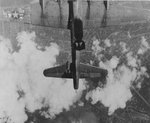
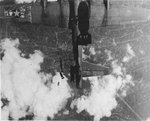
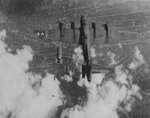
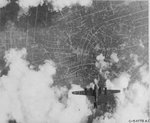
Germany
- The USAAF 306th Bomb Group flying from RAF Thurleigh launched a bombing raid against Berlin, Germany. ww2dbase [Bombing of Hamburg, Dresden, and Other Cities | RAF Thurleigh | Berlin | DS]




24 May 1944
Germany
Germany
- The USAAF 306th Bomb Group flying from RAF Thurleigh launched a bombing raid against Berlin, Germany. ww2dbase [Bombing of Hamburg, Dresden, and Other Cities | RAF Thurleigh | Berlin | DS]
22 Jun 1944
Germany
Germany
- Claus von Stauffenberg met with representatives from the German communists in eastern Berlin, Germany, not knowing one of them was a Gestapo spy. ww2dbase [Claus von Stauffenberg | Berlin | CPC]
6 Jul 1944
Germany
Germany
- Baron Hiroshi Oshima, the Japanese ambassador to Berlin, unaware that his reports were being read by the cryptanalysts in Bletchley Park in Britain, told Tokyo that the German high command was still awaiting for George Patton's army group to land in the Pas de Calais, France. A month after D-Day the "Fortitude" deception plan was still misleading the German generals. ww2dbase [Normandy Campaign, Phase 1 | Hiroshi Oshima | Berlin | AC]
8 Jul 1944
Germany
Germany
- Raoul Wallenberg landed at Tempelhof, Berlin, Germany and traveled to his sister's residence in the southwestern suburb of the city. He would experience his first air raid during that night. ww2dbase [Raoul Wallenberg | Berlin | CPC]
9 Jul 1944
Germany
Germany
- Raoul Wallenberg boarded the 1721 train from Berlin, Germany for Budapest, Hungary, arriving later that night. ww2dbase [Raoul Wallenberg | Berlin | CPC]
16 Jul 1944
Germany
Germany
- Claus von Stauffenberg hosted a party at his home at Wannsee, Berlin, Germany, which was attended by several anti-Hitler conspirators. ww2dbase [Claus von Stauffenberg | Berlin | CPC]
21 Jul 1944
Germany
Germany
- Claus von Stauffenberg was executed in Berlin, Germany. ww2dbase [Claus von Stauffenberg | Berlin | CPC]
2 Sep 1944
Germany
Germany
- German Generalfeldmarschall Wilhelm Keitel, head of Oberkommando der Heeres (OKH), ordered that "Malingerers and cowardly shirkers, including officers" should be executed immediately. ww2dbase [Wilhelm Keitel | Berlin | AC]
8 Sep 1944
Germany
Germany
- Former German intelligence officer Colonel Georg Hansen was executed at the Plötzensee Prison in Berlin, Germany. ww2dbase [Berlin | CPC]
20 Oct 1944
Germany
Germany
- Otto Skorzeny arrived in Berlin, Germany. ww2dbase [Otto Skorzeny | Berlin | CPC]
5 Dec 1944
Germany
Germany
- The USAAF 306th Bomb Group flying from RAF Thurleigh launched a bombing raid against Berlin, Germany. ww2dbase [Bombing of Hamburg, Dresden, and Other Cities | RAF Thurleigh | Berlin | DS]
15 Jan 1945
Germany
Germany
- Adolf Hitler departed the Adlerhorst headquarters in Wetterau, Germany, returning to Berlin. ww2dbase [Adolf Hitler | Berlin | CPC]
16 Jan 1945
Germany
Germany
- Adolf Hitler arrived in Berlin, Germany, and would remain here until the end of his life. ww2dbase [Adolf Hitler | Berlin | CPC]
23 Jan 1945
Germany
Germany
- Helmuth von Moltke was executed at the Plötzensee Prison in Berlin, Germany. ww2dbase [Helmuth von Moltke | Berlin | CPC]
3 Feb 1945
Germany

Germany
- Judge Roland Friesler, the fanatical Nazi who condemned to death the July plotters against Hitler, was killed during an air raid on Berlin, Germany. ww2dbase [Berlin | AC]
- BBC war correspondent Guy Byam was killed when the Flying Fortress bomber in which he was reporting on a daylight raid on Berlin, Germany was shot down. ww2dbase [Berlin | AC]
- The USAAF 306th Bomb Group flying from RAF Thurleigh launched a bombing raid against Berlin, Germany. ww2dbase [Bombing of Hamburg, Dresden, and Other Cities | RAF Thurleigh | Berlin | DS]

17 Feb 1945
Germany
Germany
- Count Folke Bernadotte of Sweden arrived in Berlin, Germany to negotiate for the repatriation of Swedish woman who had married a German man but now widowed or deserted. ww2dbase [Folke Bernadotte | Berlin | CPC]
24 Feb 1945
Germany
Germany
- Adolf Hitler made what was to be his last speech to Reischsleiters and Gauleiters in the Chancellery in Berlin, Germany. ww2dbase [Reich Chancellery | Adolf Hitler | Berlin | TH]
26 Feb 1945
Germany
Germany
- The USAAF 306th Bomb Group flying from RAF Thurleigh launched a bombing raid against Berlin, Germany. ww2dbase [Bombing of Hamburg, Dresden, and Other Cities | RAF Thurleigh | Berlin | DS]
6 Mar 1945
Germany
Germany
- Major-General Hellmuth Reymann, on Adolf Hitler's direct orders, became the military commander of Berlin, Germany. ww2dbase [Helmuth Reymann | Berlin | AC]
18 Mar 1945
Germany
Germany
- The USAAF 306th Bomb Group flying from RAF Thurleigh launched a bombing raid against Berlin, Germany. ww2dbase [Bombing of Hamburg, Dresden, and Other Cities | RAF Thurleigh | Berlin | DS]
24 Mar 1945
Germany
Germany
- B-17 bombers attacked the Daimler-Benz tank factory in Berlin, Germany; the bombers were escorted by P-51 fighters flown by African-American pilots of 332nd Fighter Group from Ramitelli Airfield in Italy. About 30 Me 262 jet fighter of German Jagdgeschwader 7 wing rose to defend. The American fighter and bomber airmen together claimed 16 jets shot down, but actual German records showed that only 8 were lost in this action. ww2dbase [Berlin | CPC]
28 Mar 1945
Germany
Germany
- The USAAF 306th Bomb Group flying from RAF Thurleigh launched a bombing raid against Berlin, Germany. ww2dbase [Bombing of Hamburg, Dresden, and Other Cities | RAF Thurleigh | Berlin | DS]
20 Apr 1945
Germany
Germany
- Theodor Morell was ordered by Adolf Hitler to leave Berlin, Germany. ww2dbase [Theodor Morell | Berlin | CPC]
21 Apr 1945
Germany
Germany
- During the night (with the Red army already entering the suburbs) RAF Bomber Command attacked Berlin, Germany for the last time during the war. ww2dbase [Bombing of Hamburg, Dresden, and Other Cities | Berlin | AC]
- Theodor Morell was dismissed from his position as Adolf Hitler's personal physician, and departed the Führerbunker in Berlin, Germany in the evening. He was replaced by Ludwig Stumpfegger. ww2dbase [Theodor Morell | Berlin | CPC]
22 Apr 1945
Germany
Germany
- Wilhelm Keitel and Alfred Jodl departed Berlin, Germany for southern Germany on Adolf Hitler's orders. ww2dbase [Wilhelm Keitel | Berlin | CPC]
- Adolf Hitler recognized that the war was lost, and released all non-essential personnel from the Führerbunker in Berlin, Germany. He assured those dismissed that "nobody is now duty-bound to anything." ww2dbase [Adolf Hitler | Berlin | CPC]
23 Apr 1945
Germany
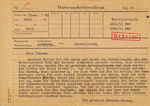
Germany
- After sundown, Albert Speer bid his final farewell to Adolf Hitler. He admitted to Hitler that he had sabotaged Hitler's scorched earth policies, and Hitler forgave him for disobeying the order. Speer toured the Chancellery in Berlin, Germany for the last time before leaving for Hamburg, Germany. ww2dbase [Reich Chancellery | Albert Speer | Berlin | CPC]
- Theodor Morell departed Berlin, Germany by aircraft. ww2dbase [Theodor Morell | Berlin | CPC]
- Adolf Hitler appointed General of Artillery Helmuth Weidling as commander of the Berlin Defence Area. ww2dbase [Battle of Berlin | Helmuth Weidling | Berlin | AC]

25 Apr 1945
Germany
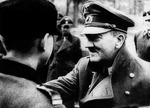
Germany
- When units of Soviet 1st Byelorussian and 1st Ukrainian Fronts met near Kietzen, completing the encirclement of Berlin, Germany. German III.SS-Panzer Korps attempted to break this newly formed encirclement in failure. About 70 kilometers to the south, American and Soviet troops met at Torgau. ww2dbase [Battle of Berlin | Berlin | TH]
- Robert von Greim arrived at Gatow, Berlin, Germany. ww2dbase [Robert von Greim | Berlin | CPC]

26 Apr 1945
Germany
Germany
- At Adolf Hitler's bunker in Berlin, Germany, Generaloberst Robert Ritter von Greim was promoted to the rank of Generalfeldmarschall and was named by Hitler as Hermann Göring's replacement. ww2dbase [Robert von Greim | Berlin | TH, CPC]
- General Walther Wenck's German 12.Armee started to move in an attempt to relieve Berlin, Germany, but this attempt was repulsed by Soviet forces. ww2dbase [Battle of Berlin | Berlin | TH]
- Hanna Reitsch attempted to convince Magda Goebbels at the Führerbunker in Berlin, Germany to let her take the Goebbels children to safety, but Goebbels refused to yield. In the evening, Adolf Hitler gave Reitsch a vial of poison before sending her on a mission out of Berlin, in case of her capture by the Soviets. ww2dbase [Hanna Reitsch | Berlin | CPC]
- Obergruppenführer Hermann Fegelein, Eva Braun's Brother-in-law, deserted his station in the Chancellery bunkers in Berlin, Germany but was found hiding at his home in the Charlottenburg district by SS-Obersturmbannführer Peter Högl and arrested. After interrogation by the Gestapo in which he reveals Heinrich Himmler's treachery he was taken out into the Chancellery gardens and shot. ww2dbase [Berlin | AC]
27 Apr 1945
Germany
Germany
- German 9.Armee and 20.Armee both attempted to attack towards Berlin, Germany, but both were rebuffed by Soviet forces. Inside Berlin, Soviet forces fought for control of Templehof airfield, Spandau, and Grunewald areas. ww2dbase [Battle of Berlin | Berlin | TH, AC]
28 Apr 1945
Germany
Germany
- In Berlin, Germany, Marshal Ivan Koniev's men had virtually cleared the Potsdamer Strasse and Soviet troops were now within a mile of the Chancellery and the Reichstag, spurred on by Joseph Stalin's explicit wish that the Soviet flag should fly there in time for the May Day celebrations. In the bunker under the Chancellery, Adolf Hitler awaited reports for the progress of the counterattack he had ordered Walther Wenck to commence; he would receive no such report as he counterattack never took place. ww2dbase [Battle of Berlin | Reich Chancellery | Berlin | CPC, AC]
- Robert von Greim departed Berlin, Germany. ww2dbase [Robert von Greim | Berlin | CPC]
- The Tempelhof airport in Berlin, Germany was seized by Soviet troops. With Berlin surrounded and much of the southern suburbs already in Russian hands, Adolf Hitler's last exit route had now been closed off. ww2dbase [Battle of Berlin | Berlin | AC]
29 Apr 1945
Germany
Germany
- Adolf Hitler married Eva Braun in his bunker in Berlin, Germany, and began dictating his final political testament and will. ww2dbase [Adolf Hitler | Berlin | TH]
- In the afternoon, Colonel Nicolaus von Below and other three adjutant officers departed Adolf Hitler's bunker in Berlin, Germany. ww2dbase [Battle of Berlin | Berlin | CPC]
30 Apr 1945
Germany

Germany
- The recently married Adolf Hitler and Eva Braun committed suicide in Berlin, Germany. Their bodies were burned near the Chancellery bunker. ww2dbase [Battle of Berlin | Reich Chancellery | Adolf Hitler | Berlin | CPC]
- In the Tiergarten district of Berlin, Germany, Zhukov launched an assault, refusing to permit an armistice, demanding only unconditional surrender. Soviet infantrymen, just 800 metres from the Reichstag, were attacked from the rear by SS diehards in the Kroll Opera House; the building was taken after several hours of bitter hand-to-hand fighting. ww2dbase [Battle of Berlin | Reichstag Building and Kroll Opera House | Berlin | TH, AC]
- Eva Hitler committed suicide in the Führerbunker in Berlin, Germany by ingesting cyanide. ww2dbase [Eva Braun | Berlin | CPC]
- Walter Schreiber was captured by Soviet forces in Berlin, Germany. ww2dbase [Walter Schreiber | Berlin | CPC]

1 May 1945
Germany
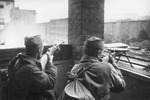
Germany
- Joseph Goebbels and his wife committed suicide in the garden of the Chancellery in Berlin, Germany after poisoning their six children with cyanide. ww2dbase [Reich Chancellery | Joseph Goebbels | Berlin | CPC]
- German 12.Armee retreated from Berlin, Germany to the Elbe River and attempted to begin negotiations with US troops. ww2dbase [Battle of Berlin | Berlin | TH]
- Hans Krebs informed Vasily Chuikov of Adolf Hitler's suicide, thus Chuikov became the first Soviet general to learn of this news. ww2dbase [Vasily Chuikov | Berlin | CPC]
- Soviet SMERSH agents arrested Reichssicherhetsdienst (RSD) Gruppe commander Oberführer Johann Rattenhuber in Berlin, Germany. ww2dbase [Berlin | CPC]
- Artur Axmann departed from Adolf Hitler's bunker in Berlin, Germany. ww2dbase [Artur Axmann | Berlin | CPC]

2 May 1945
Germany
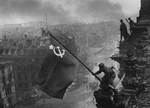
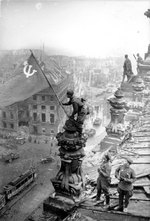
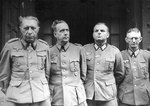

See all 2 May 1945 photos
Germany
- General Helmuth Weidling accepted General Vasily Chuikov's terms of unconditional surrender; the surrender of the Berlin garrison in Germany was to be effective at 1500 hours. ww2dbase [Battle of Berlin | Berlin | TH]
- Soviet SMERSH agents captured German SS-Gruppenführer Johann Rattenhuber, Rear Admiral Hans-Erich Voß, General of Artillery Helmuth Weidling, and SS General Wilhelm Mohnke in Berlin, Germany. ww2dbase [Helmuth Weidling | Berlin | CPC]
- The Soviet Hammer and Sickle flag was hoisted atop the Reichstag building in Berlin, Germany. ww2dbase [Battle of Berlin | Reichstag Building and Kroll Opera House | Berlin | TH]
- Werner Haase was captured by Soviet troops in Berlin, Germany. ww2dbase [Battle of Berlin | Werner Haase | Berlin | CPC]
- Kurt Fricke was killed during the Soviet attacks on Berlin, Germany. ww2dbase [Kurt Frike | Berlin | CPC]




See all 2 May 1945 photos
4 May 1945
Germany
Germany
- Hans Fritzsche was brought to the Chancellery in Berlin, Germany to identity the body of Joseph Goebbels. ww2dbase [Reich Chancellery | Joseph Goebbels | Berlin | CPC]
5 May 1945
Germany
Germany
- SMERSH agents attached to Soviet 3rd Shock Army found two burned bodies in a bomb crater near the Chancellery in Berlin, Germany and buried them without much thinking. ww2dbase [Reich Chancellery | Adolf Hitler | Berlin | CPC]
6 May 1945
Germany
Germany
- SMERSH agents of Soviet 3rd Shock Army sneaked into a section of Berlin, Germany occupied by a different Soviet unit to secretly retrieve two burned bodies near the Chancellery; they believed that one of them might be that of Adolf Hitler's. ww2dbase [Reich Chancellery | Adolf Hitler | Berlin | CPC]
- Werner Haase was brought by the Soviets to examine and identify the remains of the Goebbels family in Berlin, Germany. ww2dbase [Werner Haase | Berlin | CPC]
8 May 1945
Germany
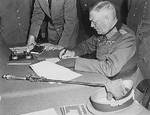

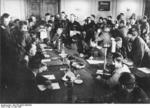
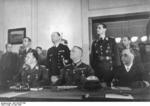
See all 8 May 1945 photos
Germany
- A special medical commission of Soviet 1st Byelorussian Front headed by Lieutenant Colonel Faust Shkaravsky performed an autopsy on the two bodies retrieved near the Chancellery in Berlin, Germany, one of which was suspected to be that of Adolf Hitler's. He noted that a part of the skull on one of the bodies was missing, but the cause of death of that person was more likely cyanide poisoning. ww2dbase [Reich Chancellery | Adolf Hitler | Berlin | CPC]




See all 8 May 1945 photos
9 May 1945
Germany
Germany
- Soviet SMERSH agents arrested Käthe Heusermann, chief assistant to Adolf Hitler's dentist Dr. Hugo Blaschke, to assist in the identification of the body retrieved in Berlin, Germany which was suspected to be that of Hitler's. ww2dbase [Adolf Hitler | Berlin | CPC]
11 May 1945
Germany
Germany
- Military medical doctor Lieutenant Colonel Faust Shkaravsky of Soviet 1st Byelorussian Front concluded that one of the two bodies Soviet SMERSH agents retrieved near the Chancellery in Berlin, Germany was that of Adolf Hitler's. ww2dbase [Reich Chancellery | Adolf Hitler | Berlin | CPC]
- Soviet counterintelligence official Pavel Meshik reported to the Soviet high command in Berlin, Germany that Soviet discipline was poor, and that lootings and rapings continued to occur in and around the German capital. ww2dbase [Battle of Berlin | Berlin | CPC]
31 May 1945
Germany
Germany
- Soviet SMERSH captured German intelligence officer Erwin Stolze in Berlin, Germany in civilian clothing. ww2dbase [Berlin | CPC]
18 Jun 1945
Germany
Germany
1 Jul 1945
Germany
Germany
4 Jul 1945
Germany
Germany
- British 7th Armored Division entered Berlin, Germany to occupy the British Zone. ww2dbase [Berlin | TH]
- General Omar Bradley took control of the American sector of Berlin, Germany from the Soviets. ww2dbase [Battle of Berlin | Omar Bradley | Berlin | AC]
10 Jul 1945
Germany
Germany
- United Kingdom, United States, and the Soviet Union agreed to include France in the administration of Berlin, Germany. ww2dbase [Germany's Surrender | Berlin | TH]
12 Jul 1945
Germany

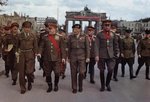
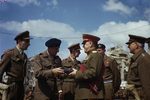
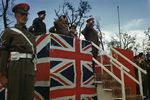
See all 12 Jul 1945 photos
Germany
- Bernard Montgomery awarded Georgy Zhukov Knight Grand Cross of the Order of the Bath at the Brandenburg Gate, Berlin, Germany. ww2dbase [Georgy Zhukov | Berlin | CPC]
- Bernard Montgomery awarded Konstantin Rokossovsky Knight Commander of the British Empire at the Brandenburg Gate, Berlin, Germany. ww2dbase [Konstantin Rokossovsky | Berlin | CPC]




See all 12 Jul 1945 photos
21 Jul 1945
Germany
Germany
- British Prime Minister Winston Churchill took the salute at a parade of the 7th Armoured Division through the Charlottenburger Chaussee in Berlin, Germany. This was a great honour to the "Desert Rats" who had fought all the way from El Alamein, Egypt to the German capital. ww2dbase [Winston Churchill | Berlin | AC]
28 Jul 1947
Germany
Germany
- British engineers demolished the smaller building of the Berlin Zoo Flak Tower complex in Berlin, Germany. ww2dbase [Berlin Zoo Flak Tower | Berlin | CPC]
30 Aug 1947
Germany
Germany
- British engineers set off 25 tons of explosives in a failed attempt to demolish the main building of the Berlin Zoo Flak Tower in Berlin, Germany. ww2dbase [Berlin Zoo Flak Tower | Berlin | CPC]
26 Sep 1955
Germany
Germany
- Erich Raeder was released from Spandau Prison in Berlin, Germany. ww2dbase [Erich Raeder | Berlin | CPC]
19 Aug 1958
Germany
Germany
- Artur Axmann was fined 35,000 German Marks by a court in West Berlin, Germany for indoctrinating German boys with Nazi Party ideology. ww2dbase [Artur Axmann | Berlin | CPC]
17 Dec 1963
Germany
Germany
- In Germany, West Berlin citizens were allowed to visit East Berlin for the first time in more than two years. ww2dbase [Berlin | CPC]
3 Oct 1990
Germany
Germany
- The official German reunification ceremony was held at the Reichstag building in Berlin, Germany. ww2dbase [Reichstag Building and Kroll Opera House | Berlin | CPC]
4 Oct 1990
Germany
Germany
- The German parliament met at the Reichstag building in Berlin, Germany for the first time since 1942. ww2dbase [Reichstag Building and Kroll Opera House | Berlin | CPC]
24 Oct 1996
Germany
Germany
- Artur Axmann passed away in Berlin, Germany. ww2dbase [Artur Axmann | Berlin | CPC]
Please consider supporting us on Patreon. Even $1 per month will go a long way! Thank you. Please help us spread the word: Stay updated with WW2DB: |
Search WW2DB

News
- » Wreck of Teruzuki Found (27 Jul 2025)
- » USS Orlean's Bow Found (22 Jul 2025)
- » The Emperor of Japan Planned to Honor WW2-era Japanese POWs in Mongolia (4 Jul 2025)
- » US State Lawmaker John Winter Caught Using Racial Slur "Jap" and Apologized (11 Jun 2025)
- » US Government Plans to Purge WW2 Information (17 Mar 2025)
- » See all news
Current Site Statistics
- » 1,182 biographies
- » 337 events
- » 45,119 timeline entries
- » 1,248 ships
- » 350 aircraft models
- » 207 vehicle models
- » 376 weapon models
- » 123 historical documents
- » 261 facilities
- » 470 book reviews
- » 28,410 photos
- » 365 maps
Famous WW2 Quote
"You ask, what is our aim? I can answer in one word. It is victory. Victory at all costs. Victory in spite of all terrors. Victory, however long and hard the road may be, for without victory there is no survival."Winston Churchill
Support Us
Please consider supporting us on Patreon. Even $1 a month will go a long way. Thank you!
Or, please support us by purchasing some WW2DB merchandise at TeeSpring, Thank you!
